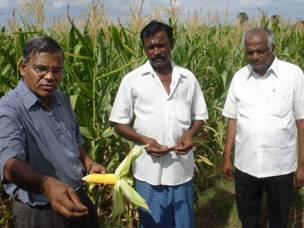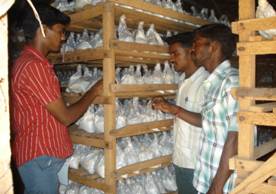 |
||||||||
|
||||||||
|
Crop Production |
Krishi Vigyan Kendra (KVK), Villupuram District | Weather |
||||||
Success Stories (Archive) Precision Farming as a Tool for the Economic Empowerment of Villupuram District Farmers Drip and fertigation system used in Precision farming ensures water economy, precise application of water-soluble fertilizers to root zone and keep an ideal soil moisture regime of 60 percent and aeration of 40%. Hearing that this system of cultivation addresses all the above mentioned issues of agriculture, Thiru. Athimoolam from Olakkur Block and Tindivanam district took up bitter gourd cultivation under this method, observed that due to the optimum usage of water and fertilizers in this system, the vegetables reaches early maturity and are ready for harvest much earlier than in the conventional method. The total yield shooted from 4 ton in conventional method to 10 tones in this system fetching a return of rupees 40,000/- per acre as against 24,000/- in the conventional method. The impact of the success swiped over to the fellow farmers and now 20 others in the village are cultivating various crops under precision farming system under the able guidance of scientists from KVK. Sugarcane cultivated by Mr.Karunanidhi at Keezhmavillangai under the precision farming system, were planted in two row system which could bear heavy winds, reduce pest and disease incidence, and provide more aeration to the roots. Water used previously for one cropping cycle could now be used for two cycles. Fertilizer given as fertigation reduced any possible wastage of both water and fertilizers and prevented unnecessary growth of weeds. Conventional planting required detrashing which in this case was not a requirement. “I am happy to inform that I am getting 110 tones as against 45 tones in conventional method by getting double returns. Apart from the confidence that has built up within me as a ‘techno-farmer’, I call this system as “A boon from the Heaven” for the farming community says a happier and a more confident Karunanidhi. Maize crop under precision farming: Using the cluster approach in order to approach the various individuals more effectively, 18 registered Precision Farmers’ Associations were formed comprising of small, medium and big farmers from different social strata and varying mind set. Trainings and field visits were performed for all the 18 associations ensuring that each individual farmer in included all of the activities. Mushroom Cultivation Elevates Socio Economic Life of Farmers in Villupuram district Commercial Production of Spawn, Mushroom and value addition of A total of fifty-five training programmes on the cultivation of milky mushroom Production of Bed Spawn The bed spawn production by different mushroom growers group ranged from 475 to 4000 numbers. They sold bed spawn to the mushroom growers belonging to Phudhucherry, Chennai and Tindivanam, Trichy, Tanjore, Cuddalore, Villupuram and Perambalur. Production and Marketing of Milky Mushroom Milky mushroom production by different groups ranged from 95 Kg to 1200Kg. Produced mushrooms were directly sold to the consumers through direct sales at farmers market and through door delivery to apartments and quarters at the rate Rs.100/Kg. Value Addition of Mushroom Horizontal Spread of the Technology: After acquiring the training and skill in the mushroom production technology, each group or association became a resource to give training to different SHG members from KVKs located at Cuddalore, Perambalur and Villupuram district. Economic Empowerment of Associations Production of Vermicompost Among the eight different groups only Hitech Milky Mushroom Growers Association produced |
||||||||
Special Technologies |
||||||||
 |
||||||||
Home | About Us | Success Stories | Farmers' Association | Farmers' Innovation | Publications | FAQs | Contact
© 2013 TNAU. All Rights Reserved. |
||||||||

 and marketing were conducted to eight different groups. The mushroom growers groups were trained to acquire skill on the production of culture tube, mother spawn, bed spawn and mushroom. Mother spawn was produced using sorghum as raw material. All the trained groups produced mother spawn. Irrespective of the groups, the production capacity varied from 100 to 500 numbers
and marketing were conducted to eight different groups. The mushroom growers groups were trained to acquire skill on the production of culture tube, mother spawn, bed spawn and mushroom. Mother spawn was produced using sorghum as raw material. All the trained groups produced mother spawn. Irrespective of the groups, the production capacity varied from 100 to 500 numbers vermicompost as a product of value addition of the mushroom spent waste, which remains as the residue after mushroom cultivation. The same group was also facilitated to receive loan from Nationalized Bank and to avail subsidies through NABARD and Agriculture Department for the construction of Vermicompost unit. This group collected all the spent waste available with other groups and added value to it as vermicompost and commercial produced the same on a large scale. The spent waste was mixed with farm yard manure in the ratio of 1:2. This group produced around 42 tonnes of vermicompost during the II year of the project period (Table 1). Vermicompost was sold in the name of Arokiya as 50 Kg bag. This developed positive mindset among the association members to run this as a commercial venture.
vermicompost as a product of value addition of the mushroom spent waste, which remains as the residue after mushroom cultivation. The same group was also facilitated to receive loan from Nationalized Bank and to avail subsidies through NABARD and Agriculture Department for the construction of Vermicompost unit. This group collected all the spent waste available with other groups and added value to it as vermicompost and commercial produced the same on a large scale. The spent waste was mixed with farm yard manure in the ratio of 1:2. This group produced around 42 tonnes of vermicompost during the II year of the project period (Table 1). Vermicompost was sold in the name of Arokiya as 50 Kg bag. This developed positive mindset among the association members to run this as a commercial venture.